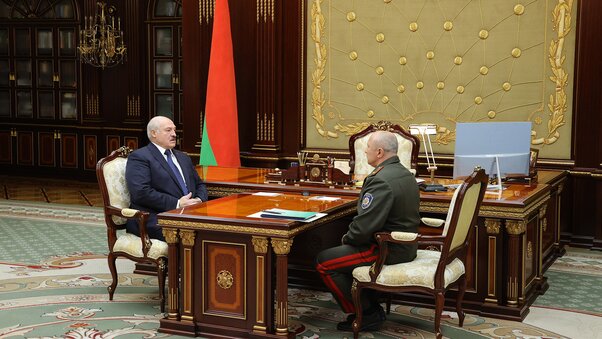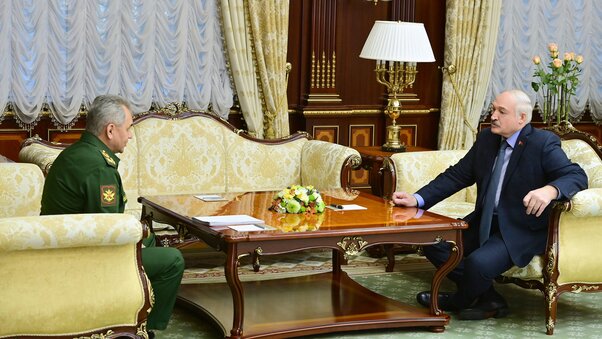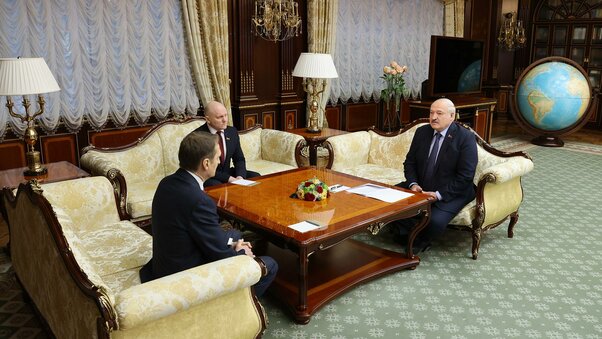Meeting with heads of security agencies and special services of CIS countries
- 13
- 23:14
Belarusian President Aleksandr Lukashenko met with participants of the 52nd meeting of the CIS Council of Heads of Security Agencies and Special Services in Minsk on 1 June.
"This is not the first time I have met with specialists, leaders both within the framework of the CSTO, and the EAEU, and so on. On the eve of any event, you think about the main things. The main thing is that all CIS member states take the council very seriously. The fact that all the heads of security agencies have arrived in Belarus shows that you see what is happening around our borders, and you understand what can happen," the President said.
The head of state noted that politicians and economists in the CIS countries could sometimes disagree in their views, but the special services have always been in close contact. "We must act in this vein now," he said.
"After the special military operation began in Ukraine and after they began to impose large-scale sanctions against Belarus and Russia, some people in our countries began to hesitate. This is probably natural. Very turbulent events happened instantly, and it takes some time to assess the situation," Aleksandr Lukashenko said. “But the special services have always kept in touch. They act calmly, quietly, imperceptibly, as befits special services. The West knows little about these contacts, so it is not that furious and makes fewer attacks on you, our allies. Meanwhile, we and Russia are at the epicenter of these turbulent events.”
Speaking about the situation in Ukraine, the President said: “I absolutely agree with President Putin’s words that it was not us who started this war. It started long before 2014. With that coup that took place then, we saw where Ukraine was led. We saw who was in the forefront.”
The President also cited the example of Russia, where since 2014 there had been many “specialists” calling for actions to protect the Russian man in Donbass. “After all, they were pushing for this in the first place. There were such “specialists” here, too. Well, we did what you asked for. Where have these “specialists” gone now? Some of them ran through the Lachin corridor, others through Belarus, but thanks God, we and Russia have strict rules... They have started criticizing the leadership of Russia - some from Israel, some from Georgia. Why are you criticizing? Yesterday you were ardent supporters of the operation,” Aleksandr Lukashenko said.
“Just imagine if Mexicans started mistreating U.S. citizens in Mexico? Mexico would have simply ceased to exist,” the President added.
The head of state stressed that the Ukrainian authorities had many options to use to ensure their people live peacefully in all of Ukraine. “But neither former [Presidents] Yanukovich, Poroshenko, nor the current [President] Zelensky took advantage of any of them. Why didn't they have a try? Did they want a war? No, they didn’t. They were just pushed to it by those who found their weak points to put pressure,” Aleksandr Lukashenko said.
The head of state expressed confidence that if it had not begun just over a year ago, it would have started tomorrow, but with worse conditions for Russia and Belarus. “We saw this coming. The only mistake we made, probably, is that we didn't resolve this issue in 2014-2015, when Ukraine had no army. We wanted to settle it peacefully. They, however, used this time to develop combat-ready armed forces,” the President said. This intention had already been confirmed by the participants of the then peace talks, including former French President Francois Hollande. “They frankly admitted that they were doing everything to prepare Ukraine for war with Russia,” the Belarusian leader said.
Addressing representatives of the security and special services of the CIS countries, the President said: “We should all calm down. I just ask you to influence the policy inside your countries so that we do not separate. This can be very dangerous.”
“No one needs us, except for other countries that emerged on the post-Soviet space after the collapse of the Soviet Union. In fact, we speak the same language, we have a common economy, we have common markets, we cooperate in the manufacturing industry, and so on. It took generations to achieve it. So why destroy it? Why ruin this common market?” the President asked rhetorically.
According to Aleksandr Lukashenko, closer cooperation between the former Soviet republics brings them significant economic benefits. When, for example, Uzbekistan stepped up cooperation with the Commonwealth, this generated an extra $1.5 billion for the country, and the figure is even higher today. “It means that it is here where we belong. No one invited you to other markets. Why ruin it today?” the head of state asked.
The President recalled how he once tried to convince the leaders of Ukraine and Georgia not to rush out of the CIS. “It will be more difficult to return, but there will be no escaping it. Economic considerations will push us to do it,” he is convinced.
“Here is another example. It seems that Ukraine means the world for Europe, the USA. They threw in their lot with Ukraine. If so, they need to support it. Yet, when it comes to basic things… As soon as Ukraine took out its grain from warehouses and started sending it to Europe, everyone shut themselves off from it, including frenzied Balts, and frenzied Poles, and even Slovaks. Everyone closed their markets for Ukrainian grain. Why? Because prices for their own grain began to drop. Farmers got indignant. Grain is just one thing. What else will Ukraine be able to sell on the Western market? Nothing. Once the war is over, they will come to us anyway,” the Belarusian leader is sure.
An uncertain situation has also evolved in Moldova, the President noted. Due to short-sighted decisions of local politicians, the country’s economy has started to contract. “Is it really what they wanted?” asked the head of state.
“The key is economy and people’s well-being,” Aleksandr Lukashenko emphasized.
The President gave another example: the West is trying to bring Belarus and Russia to their knees, but this only leads to the opposite. “A revolution is already unfolding there. Questions arise as to why they give so much money to Ukraine to kill people, while their own lives are getting worse and worse. And this trend is not just taking shape, it will soon reach its peak. Today, the West and the Americans want some pause in Ukraine, they want to bring hostilities to a halt. Why so? In order to hold elections, first of all, in the United States of America. Let them sit down at the negotiating table and come to an agreement to stop the war, instead of looking for some ways to achieve a respite before they start anew. We have gone through this many times. We are not buying it,” the head of state said.
At the meeting the head of state commented on the military and political situation around the CIS.
"The military-political situation around the CIS is aggravating and will continue to escalate. We need to understand that the big players are trying to pull us, Russia, Belarus, the Central Asian states, apart, using carrots and sticks. We, people, must not allow this. This is my firm belief. I feel it in my gut. After all, I have been working as President for some time now. We see the growing militarization of the NATO countries and the unprecedented concentration of troops near our common territory, the incitement of conflicts," Aleksandr Lukashenko said.
The President touched on Poland that got rid of its old weapons by dumping it to Ukraine and that is equipping its army with modern U.S. hardware. "The United States has designated Poland as the main pillar of NATO in Europe. But, fortunately (I am not rejoicing at this, but there is nothing to be sad about), they are creating problems not only on our borders but are picking up a fight with Germany. In my opinion, Poland, without any reason, acts like an elephant in the room. But this is up to them," the head of state stressed.
The already powerful political and economic pressure by the United States and the EU is ever increasing, and blatant attempts to limit the scientific and technological development of the CIS countries continue, the President noted. At the same time, contradictions between the United States and the European Union are growing, Aleksandr Lukashenko noted. "The United States is not only trying to use the European Union in the war in Ukraine (they have already robbed them blind) but also in their confrontation against China. The trade between China and the European Union is colossal. The EU are pragmatists and they understand that the severance of relations between the European Union and China, which the United States is pushing for, will lead to even more sad economic consequences in Europe," the President explained.
The collective West uses international law as an instrument of pressure on us, but when it is beneficial to them, completely ignores it, the head of state emphasized. "This international law is practically gone," he added.
The President named key security threats to the CIS.
“Today one of the key threats is information and psychological warfare and fake information. The purpose of such actions is to undermine the authority of our states in the international arena. And not only that. Take the recent drone attacks on the Russian Federation. What was their impact in military terms? Almost zero. However, this can work pretty well when used as part of the information warfare,” Aleksandr Lukashenko said. “People start talking about such things both in Russia and here, and in other countries. Therefore, the information and psychological warfare embraces everything: economy, scientific and technical cooperation, internet, and even armed provocations,” Aleksandr Lukashenko said.
The head of state stressed that the information monopoly of the West, in particular the control over the internet, the main social networks and international media, only serves this matter.
“They protect this monopoly, as well as their manic desire to prevent a multipolar world, by the slogan of this fight for democracy. There is nothing behind their ‘democracy'. There is no democracy there. Thank God, we have already understood that. We have seen how they act in the United States and what they are trying to make us do. Using this slogan, the Western elites will be working to disrupt our integration processes, force our countries to abandon partnerships and artificially create points of tension in and around the CIS,” the President said.
The most eloquent example of this is the current situation in Ukraine, which is used as a bargaining chip in geopolitical games today, the head of state said.
“Intelligence information which we receive, including thanks to the partnership between the intelligence agencies, shows that the abovementioned threats will continue increasing in the foreseeable future,” the Belarusian leader said. “If some of us think that we will be able to sit it out, we will not. Recent events in Kazakhstan serve as a blatant example. There's always an internal element. Such things do not come from nothing. There is always some internal element. There are forces, interested in destabilization, returning to power, and so on. Foreign secret services quickly create a whole bunch of these elements around this internal one to destabilize the situation in our countries. Kazakhstan is a vivid example of it and of our strength when we act united. It may seem we did not do much, but they saw our determination and backed off. That is why we need to stand by each other.”
During the meeting, Director of the Federal Security Service of Russia Alexander Bortnikov said that the West wanted to destabilize the situation in the CIS by increasing the conflict potential within the CIS and at its borders.
“The United States and the UK are actively working to separate the CIS countries. The intelligence community and diplomatic missions are working with the political and economic elites of the CIS states. This is the situation which is taking shape today. We see it all. Under the threat of secondary sanctions or the promise of preferences, they are trying to drive a wedge between our countries and impose favorable formats of cooperation in defense and security to extraregional players,” the head of the Russian secret service said.
He cited the examples of recent frequent visits of the heads of the security agencies of the NATO bloc to the CIS countries. “The United States and the UK are doing their best to influence the political leadership [of the CIS states] as well,” Alexander Bortnikov said.
According to him, the American and British intelligence, supported by the media and NGOs, has deployed a large-scale activity to prepare the conditions for a violent coup in the CIS countries. “We see this and take measures to neutralize these threats,” the director of the Federal Security Service of Russia said.
“As far as Belarus is concerned, Poland, Lithuania and, unfortunately, Ukraine provide a training ground for members of illegal armed groups; these countries are trying to create dormant extremist cells in our country. We have fresh evidence of this,” the President noted.
The head of state recalled the recent joint operations with Russia, that resulted in the seizure of explosives and hence the prevention of terrorist attacks in Belarus. “This fact shows that they won’t leave us alone,” said Aleksandr Lukashenko. “Militants are being trained in Ukraine; they are honing their skills on the frontline. Some of self-exiled Belarusians die there. Such units are being trained in Poland, Lithuania and Czechia to be sent to Belarus at the right moment. And this is no longer 2020, when girls went to rallies wearing short white skirts and holding flowers. People are ready to come here with weapons. Therefore, we have to pay a lot of attention to protecting our borders,” the head of state remarked.
The President noted that it is no longer enough for the self-exiled opposition to make statements for the media to get funding from Western curators. Now they demand decisive action. In other words, money in exchange for terrorist attacks, an armed fight. “Pay attention to this. This pertains to all our states,” the President of Belarus warned.
“In other words, they are preparing a violent scenario to topple the government. We see this. We will not allow this to happen,” Aleksandr Lukashenko said. “You are well aware that you are also facing these threats to some extent. Do not allow provocations and pressure. Any actions and decisions of the CIS states that do not meet the expectations of the West can become a pretext for accusations and sanctions. Your role in such a situation is becoming much more important,” the President said.
The CIS Council of Heads of Security Agencies and Special Services is one of the platforms for developing a response to such a hostile policy. “I am sure that today’s meeting will also be effective and you will make specific decisions to counter the challenges that I have outlined. I am absolutely sure that only by joining efforts will we be able to resist this aggressive attack and cope with all threats. Today we are able to do this, and we need to keep it up,” the Belarusian leader stressed.


